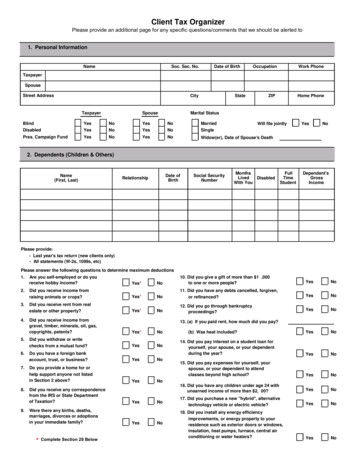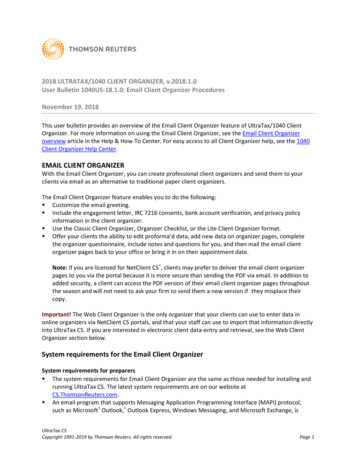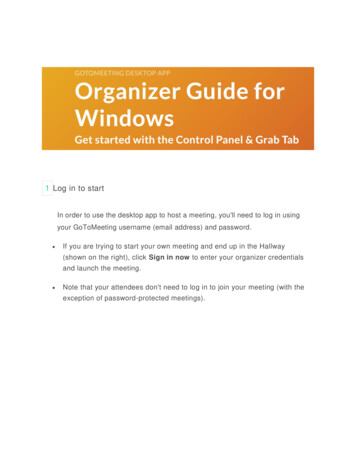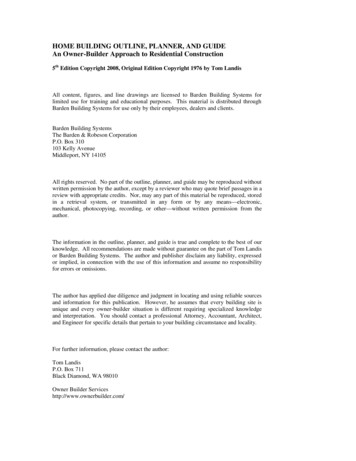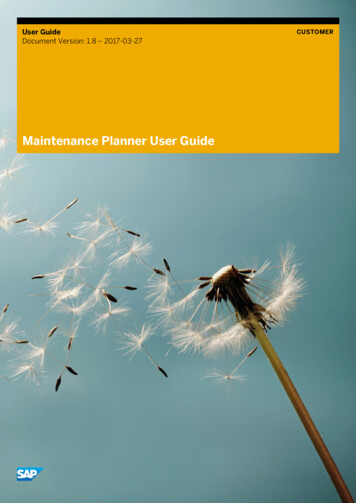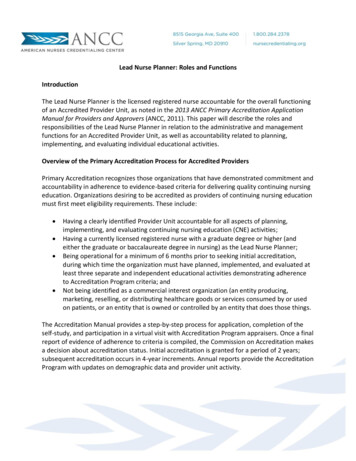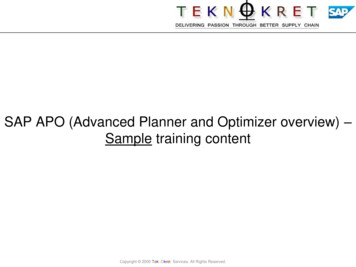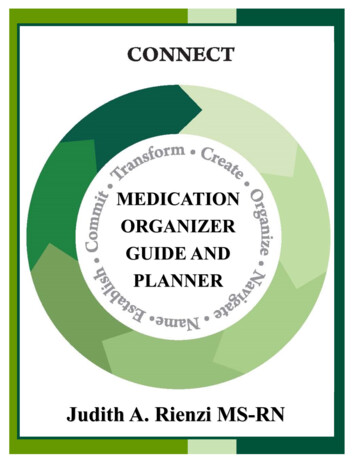
Transcription
MEDICATIONORGANIZERGUIDE ANDPLANNERJudith A. Rienzi MS-RN
ABOUT THE AUTHORJudy Rienzi is the president and owner of Health Promotion Associates, LLC, and the author of the CONNECTHealth Management System. The CONNECT Method for Healthy Living are interactive and facilitativeorganizers, guides and planners, that empower individuals to be active participants in their own health andhealthcare.Judy is certified as a Holistic Health Practitioner, Integrative Imagery Practitioner, and hold certificates inPlant-based Nutrition and Aromatherapy.Health Promotion Associates, LLCwww.healthpromotionassociates.comDISCLAIMERThe CONNECT medication organizer, guide & planner is for educational purposes only. It was designed tohelp you in your daily medication self-management. It is not intended to replace any information, instruction, oradvice from your doctor. 2016 Judy Reinzi, MS-RN. All rights reserved.Page 2
TABLE OF CONTENTSMedication Self-Management -------------- Page 4Steps for Successful Medication Self-Management -------------------------------------- Page 5Symptom Checklist --------------------------- Page 6Questions to Ask Before Taking Your Medication -------------------------------------- Page 7Prescription Medication Manager ------ Page 8-9Supplements and Over the Counter (OTC) Medications -------------------------- Page 10-11Do’s and Don’ts of Medication Safety --- Page 12Side Effects and Reactions ----------------- Page 13List of Medications -------------------------- Page 14References ------------------------------------- Page 15 2016 Judy Reinzi, MS-RN. All rights reserved.Page 3
MEDICATION SELF-MANAGEMENTMedication self-management is an important part of your personal self-care. Taking your medication, andtaking it properly, can help you avoid complications from an already existing health condition, improve or slowthe progression of a disease, relieve symptoms, and improve your quality of life. Taking your medicationproperly can help you obtain your health goals and reach the healthy outcomes you desire.However, most people have difficulty following their medicationregimen due to a variety of reasons. The National Academy ofSciences estimate 1.5 million people each year encounter serioushealth consequences due to medication errors. Let’s explore thereasons why people do not stick to their medication regimen.According to the Henry FordMacomb Hospital, 125,000Americans die each year becausethey do not take theirmedications properly. People do not take their medication because they forget. People start to feel better and stop taking it. The medication doesn’t seem to be working, or it is not working fast enough and they give up. They believe they don’t need it. Most often people don’t fully understand why they are taking it or what the health consequences will beif they suddenly stop taking it. People don’t understand how it should be taken throughout the day. People find it too costly.Check any or all boxes that you believe apply to you. Below, write down any other additional issues that youmight have that are affecting keeping up with your medication regimen. 2016 Judy Reinzi, MS-RN. All rights reserved.Page 4
STEPS FOR SUCCESSFUL MEDICATION SELF-MANAGEMENTFollow the steps below for successful medication self-management:1.Fill your medication prescription. Your Pharmacist is part of your health team. Talk with him or herabout your prescription and ask questions.2.Know about your medication in order to take it properly. A clear understanding of why and how thismedication was prescribed, and the physical consequences of not taking this medication will help youstay on track.3.Organize your medication using a pill organizer. Store your medication bottles and supplements inthe same place. Fill up your pill organizer where you store your medication. This way, you don’t have tomove the bottles and they won’t get lost.4.Create a schedule, such as;In the morning I will takeIn the afternoon I will takeIn the evening I will takeYou can be more specific and write down the actual times you need to take them, or create a weeklychecklist.5.If you have a medication that must be stored in the refrigerator, then place a sticky note, or acolored dot on the pill organizer at the time you need to take it, to remind you of that medication.6.Keep a list of all your current medications, why you are taking them, dosage, frequency, and whoprescribed them. Keep this list handy. You can take it with you when you go to medical appointments.7.Monitor your symptoms to notice changes in your health.Ask yourself:8. What have you noticed since you’ve been on this medication? Have your symptoms changed since you have been on this medication? What action will you take if you have side effects?Continue using your medication for as long as is prescribed. Before starting your medication, discusspotential side effects with your doctor or pharmacist and what course of action to take if you do haveside effects. 2016 Judy Reinzi, MS-RN. All rights reserved.Page 5
SYMPTOM CHECKLISTIt’s important to take note of all your symptoms. This will help determine if the medication is helping you.DateSymptom 2016 Judy Reinzi, MS-RN. All rights reserved.Note Any Changes (Positive/Negative)Page 6
QUESTIONS TO ASK BEFORE TAKING YOUR MEDICATION1.Why do I need this medication?2.How long do I need to take it?3.How will this medication help me?4.Can I take the generic form?5.How long will it take before the medication starts working?6.What are the side effect?7.How do I take this, with meals or without meals?8.How often do I take this during the day?9.What adverse reactions should I look for?10. What should I do if I have a reaction to it?11. What should I do if I miss a dose?12. Is this medication habit forming?13. How will I know if it is working? Are there blood tests I need to take?14. Does this need to be refrigerated?15. Are there any foods or supplements that interfere with this medication?What additional questions do you have about your medication? 2016 Judy Reinzi, MS-RN. All rights reserved.Page 7
PRESCRIPTION MEDICATION MANAGERMedication:Dose:Date:How many times per day?Why was it prescribed?Who prescribed it?Medication:Dose:Date:How many times per day?Why was it prescribed?Date:How many times per day?Why was it prescribed?Date:How many times per day?Why was it prescribed?Date:How many times per day?Why was it prescribed?With meals? (Y/N):Who prescribed it?Medication:Dose:With meals? (Y/N):Who prescribed it?Medication:Dose:With meals? (Y/N):Who prescribed it?Medication:Dose:With meals? (Y/N):Who prescribed it?Medication:Dose:With meals? (Y/N):Date:How many times per day?Why was it prescribed?With meals? (Y/N):Who prescribed it?Notes: 2016 Judy Reinzi, MS-RN. All rights reserved.Page 8
PRESCRIPTION MEDICATION MANAGER (Continued)Medication:Dose:Date:How many times per day?Why was it prescribed?Who prescribed it?Medication:Dose:Date:How many times per day?Why was it prescribed?Date:How many times per day?Why was it prescribed?Date:How many times per day?Why was it prescribed?Date:How many times per day?Why was it prescribed?With meals? (Y/N):Who prescribed it?Medication:Dose:With meals? (Y/N):Who prescribed it?Medication:Dose:With meals? (Y/N):Who prescribed it?Medication:Dose:With meals? (Y/N):Who prescribed it?Medication:Dose:With meals? (Y/N):Date:How many times per day?Why was it prescribed?With meals? (Y/N):Who prescribed it?Notes: 2016 Judy Reinzi, MS-RN. All rights reserved.Page 9
SUPPLEMENTS AND OVER THE COUNTER (OTC)MEDICATIONSSupplement or OTC:Dosage:Date:How many times per Day:Why are you taking this?Supplement or OTC:Dosage:Date:How many times per Day:Why are you taking this?Supplement or OTC:Dosage:Date:How many times per Day:Why are you taking this?Supplement or OTC:Dosage:Date:How many times per Day:Why are you taking this?Supplement or OTC:Dosage:Date:How many times per Day:Why are you taking this?Supplement or OTC:Dosage:Date:How many times per Day:Why are you taking this?Supplement or OTC:Dosage:Date:How many times per Day:Why are you taking this? 2016 Judy Reinzi, MS-RN. All rights reserved.Page 10
SUPPLEMENTS AND OVER THE COUNTER (OTC)MEDICATIONS (Continued)Supplement or OTC:Dosage:Date:How many times per Day:Why are you taking this?Supplement or OTC:Dosage:Date:How many times per Day:Why are you taking this?Supplement or OTC:Dosage:Date:How many times per Day:Why are you taking this?Supplement or OTC:Dosage:Date:How many times per Day:Why are you taking this?Supplement or OTC:Dosage:Date:How many times per Day:Why are you taking this?Supplement or OTC:Dosage:Date:How many times per Day:Why are you taking this?Supplement or OTC:Dosage:Date:How many times per Day:Why are you taking this? 2016 Judy Reinzi, MS-RN. All rights reserved.Page 11
DO’S AND DON’TS OF MEDICATION SAFETYDODON'T Tell your doctor if you are pregnant, planning to becomepregnant, or nursing. Discuss all the medications you are taking, includingsupplements and over the counter medications, Tell your doctorif you have allergies. Tell your doctor if you had a medication reaction in the past. Get to know your pharmacist. Ask questions about how to takethis medication, interactions, side effects, or any concerns youmay have about it. Learn how to store your medication properly. Ask your doctor if there is a generic form of the medication. Do not skip medication or change the dosage. Do not stop taking the medication unless you have a reaction. Never use someone else’s medication and do not share yourmedication with anyone. Do not use expired medication. Do not let your medication run out or expire. Refill at least 5-7days in advance. Some pharmacies have an automatic refillservice so you will get you medication up to a week inadvance. 2016 Judy Reinzi, MS-RN. All rights reserved.Page 12
SIDE EFFECTS AND REACTIONSWhat side effects have you noticed since you started this/these medication(s)?NOTE: Call your doctor or pharmacist immediately if you are having a negative reaction to a drug.PHARMACY INFORMATIONPharmacy Name:Phone Number:Name of Pharmacist:PHYSICIAN INFORMATIONPhysician’s Name:Specialty/Type of Doctor:Phone Number:Physician’s Name:Specialty/Type of Doctor:Phone Number:Physician’s Name:Specialty/Type of Doctor:Phone Number:Physician’s Name:Specialty/Type of Doctor:Phone Number:Physician’s Name:Specialty/Type of Doctor: 2016 Judy Reinzi, MS-RN. All rights reserved.Phone Number:Page 13
LIST OF MEDICATIONSList all your medications, supplements, and over the counter medication. Print this and take it with you to allyour medical visits.Medication/OTC/Supplement:Dosage: 2016 Judy Reinzi, MS-RN. All rights reserved.Times per day:Reason for taking this:Page 14
REFERENCESArcadia Healthcare and Staffing; www.arcadiahome.com; “What is Medication Management?”Henry Ford Macomb Hospital; www.henryford.com; Macomb News; “Taking Medication Correctly is Criticalto Managing Illness, Preventing ComplicationLiving a Health Life with Chronic Conditions, 4th Edition Bull Publishing, Boulder Co 2010; Authors: KateLorig, DrPH; Halsted Holman, MD; David Sobel, MD; Diana Laurent, MPH; Virginia Gonzalez, MPH; MarianMiner, RPT, PhD.Livingwellseontario.ca (Self-management Program)National Academy of Science-Engineering-Medicine; www8.nationalacademies.org; News; July 20, 2006 2016 Judy Reinzi, MS-RN. All rights reserved.Page 15
2016JR,MSRN.A.
colored dot on the pill organizer at the time you need to take it, to remind you of that medication. 6. Keep a list of all your current medications, why you are taking them, dosage, frequency, and who prescribed them. Keep this list handy. You can take it with you when you go to medical appointments. 7.

